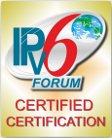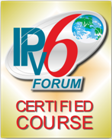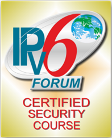Certifications
All Erion IPv6 courses are certified by the IPv6 Forum. Erion also has its own IPv6 certification programme.



IPv6 is the result of many years of research and activity by the international Internet community. IPv6 provides increased addressing space, improved routing, better security and support for new applications.
The implementation of IPv6 is inevitable and will impact on all companies that maintain, implement or use IP networks.
In this course, you will learn how the IPv6 protocol and related protocols differ from IPv4 and how this impacts writing network software. You will learn complex options available for migrating code to IPv6 and the best practice approaches that should be used in different scenarios. The course shows you how to migrate legacy applications to IPv6. The course includes extensive hands-on IPv6 practical exercises and in-depth technical analysis.
This course is ideal for Unix and Windows software developers working in C and C++, who use the sockets interface.
During the course there will be many opportunities for hands-on work. Each module has detailed exercises or demonstrations associated with it. Every delegate has at least one server provided for their own use.
Practicals are run on a mixture of Linux, and Windows. Delegates will have the opportunity to choose their preferred platform or platforms.
All Erion IPv6 courses are certified by the IPv6 Forum. Erion also has its own IPv6 certification programme.



All our trainers are practising network consultants with extensive experience with IPv6 networking on UNIX, and Windows in large commercial environments. They are ideally suited to bringing you the highest quality of training.
Erion is the world's leading IPv6 training company.
Our courses are available world-wide in our virtual classrooms accompanied by virtual labs. We also deliver on-site training and public training at venues around the world.
Please contact us if you are looking for training in your area.